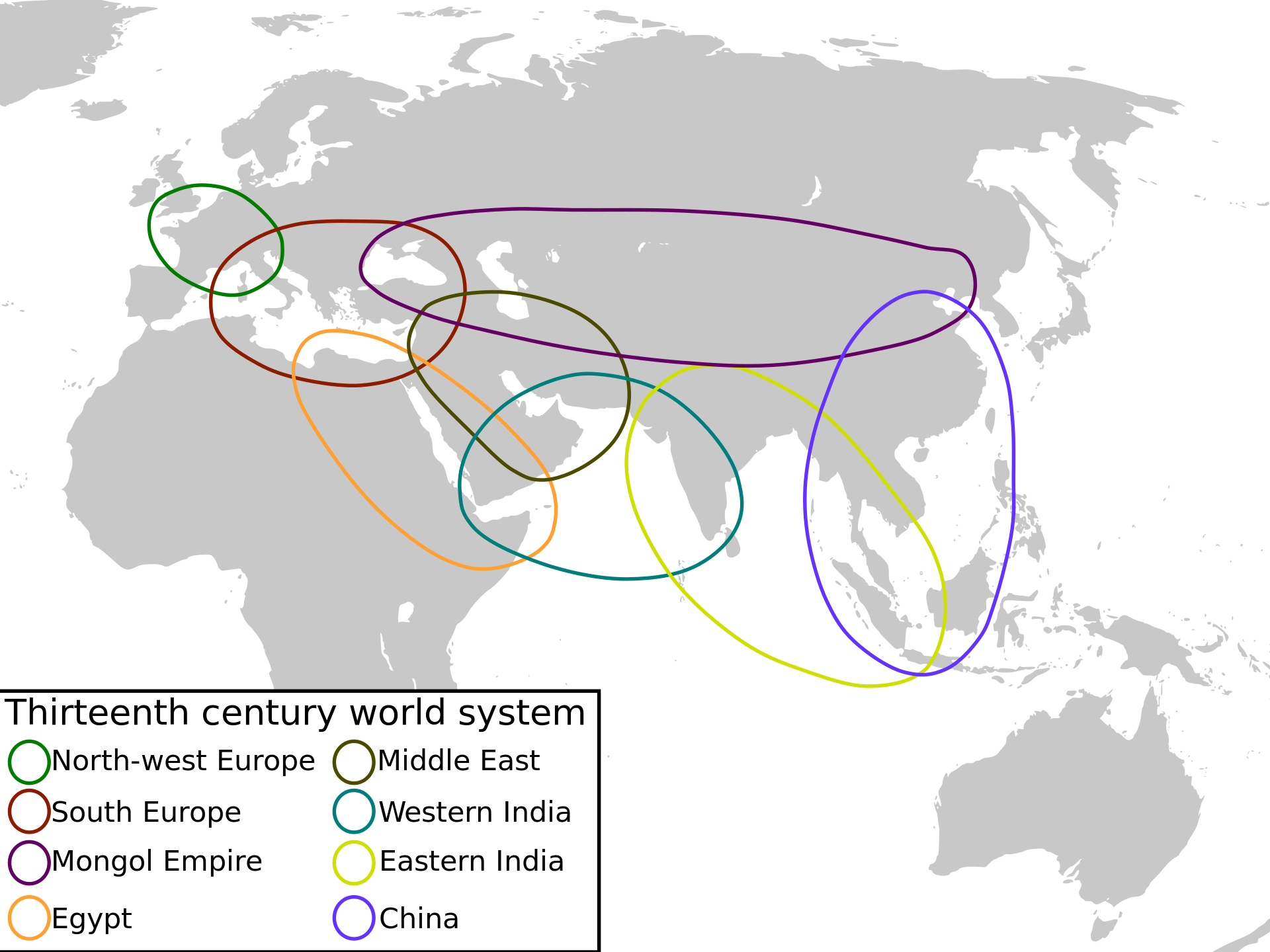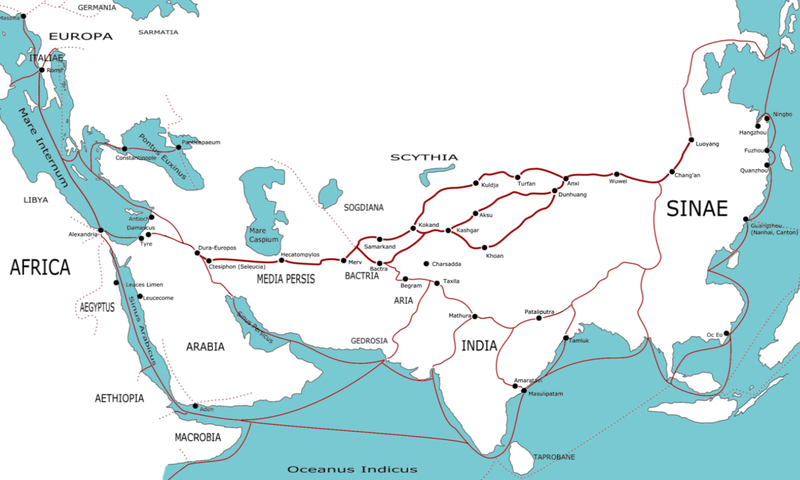
グローバリゼーションと文化
Globalization and Culture; 旧称:第2章「グローバリゼーションの挑戦」

「1990年代に登場した唯一の新 たな要素はインターネットの拡散であったが、当時は主として すでに発展した世界に影響を与えただけであった。2000年 には、世界人口のわずか5%がインターネットを利用していたにすぎない。だが、2010年には34 %に達している。インターネットは世界のさまざまな地域に浸透して相互に結びつけ、グローバリゼーション のひとつの推進力となっていることは間違いなかろう。しかし、1990年代に始まった インターネットの急速な拡大によっては、90年代が始まろうとしていたときにグローバリゼーション への関心が突然に増大した事実を説明することはできない。// ……1990年代にグローバリゼーションが発生し、その時に根本的に異なった形態を取る ことになったという理由によって、グローバリゼーションが突如として注目を集め始めたわけではな い。現実に起こったことは、ソビエト連邦の解体と冷戦の終鷲であった。グローバリゼーションは、 資本主義と共産主義という冷戦による分断の終鷲によって醸成されたイデオロギー的な空白を埋めた のだ。ソ連が解体して共産主義が不可避の問題として存在するのをやめたときに、世界の秩序は不安 定なものとなっていった。そこでのグローバリゼーションは、ひとつの確かなものに見えた。さらに いえば、グローバリゼーションはソ連の凋落を説明してくれた。もはや国家主導の産業は、1980 年代に勃興した電子化されたグローバル経済に対抗できなかったのである」(リン・ハント2016:48-49)——「書名に『グローバリゼーション』を含む英語の書物 数(WorldCatによる)」リン・ハント(2016:48)
| 頁 |
パラグラフ |
||
| 47 |
1 |
1.グローバリゼーション ・歴史家がグロバリゼーションを発見した のは最近だ(47) |
|
| 2 |
「書名に『グローバリゼーション』を含む
英語の書物数(WorldCatによる)」リン・ハント(2016:48) 「2000年
には、世界人口のわずか5%がインターネットを利用していたにすぎない。だが、2010年には34
%に達している。インターネットは世界のさまざまな地域に浸透して相互に結びつけ、グローバリゼーション
のひとつの推進力となっていることは間違いなかろう」 |
||
| 3 |
・ソビエト崩壊と冷戦の終結 |
||
| 4 |
・1980年代以降の新自由主義 |
||
| 5 |
・「歴史家たちは、グローバリゼーション
を関心の対象として取り上げるのが遅かった。歴史家がそれ
を無視したのには、独自の理由がある。歴史家のあいだでは、国民国家中心的な在であったからだ」(50) |
||
| 6 |
・「大学レヴェルでの専門化は、専門職の
歴史家と彼らが研究する国民史のあいだの絆を強固にした」(51) |
||
| 7 |
・「専門化は、歴史学やほかの社会科学や
人文学の領域が自然科学を模倣する傾向から派生したものだ
った。専門家であるということは、研究領域をマスターし、検討すべき適切な問題を設定し、それに
対する調査を実行、その発見を出版するということだ。かくして、ある種の悪循環が続くことになる。
大学側が専門家としての実績の提示を要求するにつれて、出版数は増加する。出版書の数が急激に上
昇すれば、対象とする領域が以前にはなかったほどに狭陸化して定義されていく」(51) |
||
| 8 |
|||
| 9 |
|||
| 53 |
10 |
・「1990
年代後半、ヨーロッパ議会の通達第2183号によって、ヨーロッパ連合内の学校では、そのシラパ
スに「ヨーロッパ全体の歴史、すなわちヨーロッパのアイデンティティをかたちづくってきた主要な
政治的・経済的事件と哲学的・文化的運動」を含めるように勧告している」(53) |
|
| 11 |
|||
| 12 |
・アイデンティティ強化への反省 ・「旧ユーゴスラビアの解体のあと、国連とヨーロッパ 歴史教育協会が、ボスニア、クロアチア、セルビアの歴史を民族集団のあいだでの敵対心をこれ 以上悪化させない方法で教えることを目的とする国際セミナーを開催した。歴史学は、その動員力を 失っているわけではない。グローバリゼーションの志向性をもつ歴史は、自国の国民的帰属意識だけ ではなく国際的市民性の感覚を掴養するために役立つであろう。しかし、その効果は、現実のものと いうより、期待値の段階にとどまっている」(12) |
||
| 13 |
|||
| 14 |
・「フェーヴルやクルーゼが60年前に論
じたように、ヨーロッパ内のフランスでさえ、
もはや明らかにフランス的なものと見なすことはできない。たとえば、フランス最初に設
立されたのは、17世紀のパリで、アルメニア人の商人によるものであった。多くランス人は、
19世紀の後半までフランス語を話すことはなかった。グローバル・ヒストリーは、ナショナリズム
が塗りつぶした過去の背後に蠢いているものなのである」(55) |
||
| 15 |
|||
| 16 |
|||
| 17 |
・「グローバリゼーションは人類史を貫流
する長期的なプロセスとして見なすことができる。だが、グローバリゼーション
に関するほとんどの論者は、ここ2、30年に焦点を合わせている。この短期的
視点からは、経済的なグローバリゼーションは、金融制度、交易ネットワーク、( 多国籍、トランスナ
ショナル資本主義といわれる)生産循環の世界規模での浸透となる。技術的なグローバリゼーションは、
広範にアクセスできる航空旅行、中央集権化された運輸、コンピュータの拡大、それにともなうイン
ターネットへのアクセス、ごく最近では、GPS 衛星、無線通信などを通じての時間と空間の圧縮に
ある。社会的グローバリゼーションは、固から国へ、そして農村部から都市へ、とりわけグローバル//
なメガロポリスである上海、メキシコシティ、ニューヨークへの移民の増大が原因となっ
ている。政治的グローバリゼーションは、軍事(合衆国)や軍事的抵抗(テロリズム)を通じた世界覇権の
確立の試み、大規模な政治単位の影響力の増大(ヨーロッパ連合、世界貿易機構、国際連合)、人権などの
政治討議のグローバルな枠組みなどを含んでいる。文化的グローバリゼーションは、アイデンテイテ
イや日常生活の行動のグローバルな形態の発展である。混交的で離散民的(ハイブリッドデイアスポラ)なアイデンティティが、よ
りいっそう重要になっている。アニメ、ビデオゲーム、コーヒー、コカ・コーラ、空港ラウンジなど
が世界規模で散見しうる。たとえば、イスラームや福音主義的プロテスタンテイズムなどの宗教運動
は、そのアイデンティティを国際化に依存するようになっている。多くの場合、生物学的形態の
グローバリゼーションは否定的なものとなる。国際的な旅行が、ごく短期間に地球規模での流行病の拡散
を可能にしているからだ」(56-57) |
||
| 18 |
|||
| 19 |
2.トップダウン |
||
| 20 |
|||
| 21 |
・「モダニティはグローバル化する傾向を
もつ」(21) |
||
| 22 |
|||
| 23 |
|||
| 24 |
・ウォーラスティン |
||
| 25 |
・従属論 |
||
| 26 |
|||
| 27 |
|||
| 28 |
・アパデュライの「グローバルエスノス
ケープ」(62) |
||
| 29 |
|||
| 30 |
|||
| 31 |
|||
| 32 |
|||
| 33 |
|||
| 34 |
|||
| 35 |
・アニーバル・キハーノ ・「ペルーの社会学者アニーバル・キハーノは、グローバリゼーションの起源について別なかたちでの反 ヨーロッパ中心主義的な歴史解釈を提示している。彼が強調するのは、「アメリカ」(アメリカ大陸)に よって演じられる重要な役割である。「アメリカは、最初の近代的でグローバルな地政文化的アイデ ンティティである。ヨーロッパは二番目のものであり、アメリカのアイデンティティの帰結として形成されたのであって、その逆ではない」。近代的な形態の ヨーロッパとは、先住民、黒人、メスティ ーソに苦役を課すことで形成されたのであり、そうした人びとは「鉱山業や農業における発達した技 術」や、金、銀、ジャガイモ、トマト、タバコのような重要な材料を食卓にもたらした。そのことに 関しては、ヨーロッパでもなく、「東洋」でもなく、南北アメリカ大陸が、因果関係上の引き金を引 いたことになる」(66) |
||
| 36 |
|||
| 37 |
|||
| 38 |
|||
| 39 |
3.ボトムアップ |
||
| 40 |
|||
| 41 |
・ボトムアップ論文 |
||
| 42 |
|||
| 43 |
|||
| 44 |
|||
| 45 |
|||
| 46 |
|||
| 47 |
|||
| 48 |
|||
| 49 |
|||
| 50 |
|||
| 51 |
|||
| 52 |
4.普遍性と多様性 ・「グローバリゼーションのような普遍的概念は、本質的に西欧的なものではない。なぜなら、それら は普遍的であるからだ。ウオルター・ミニヨロは、普遍主義的立場を拒否するもののひとりである。 なぜなら、普遍主義は、西欧文明の覇権の再強化を意味するものにほかならなかったからである。彼 が唱導するのは、「多元性で、それは、普遍性に対するオルタナテイヴであり、正義、平等、人権 認識論的多元性などの名前のもとで、グローバリゼーションと地球規模で対時するネットワークのも たらす可能性を提示している」。感情的には反ヨーロッパ中心主義を賞賛しているかもしれないが、 ミニヨロは、何が正義、平等、人権、認識論的多元性を正当化するのかについては説明していない。 多元性を希求することさえも、それ自体が普遍的な主張ではないのか。グローバリゼーションを批判 するほかの多くのものと同じく、ミニョロはそれを所与のものとして、また一枚岩的なものと見なし ている」(77) |
||
| 53 |
|||
| 54 |
|||
| 55 |
|||
| 56 |
|||
| 57 |
|||
| 58 |
|||
| 59 |
|||
| 60 |
★参照「グローバリゼーション」
| Globalization is the
process of increasing interdependence and integration among the
economies, markets, societies, and cultures of different countries
worldwide. This is made possible by the reduction of barriers to
international trade, the liberalization of capital movements, the
development of transportation, and the advancement of information and
communication technologies.[1] The term globalization first appeared in
the early 20th century (supplanting an earlier French term
mondialisation). It developed its current meaning sometime in the
second half of the 20th century, and came into popular use in the 1990s
to describe the unprecedented international connectivity of the
post–Cold War world.[2] The origins of globalization can be traced back to the 18th and 19th centuries, driven by advances in transportation and communication technologies. These developments increased global interactions, fostering the growth of international trade and the exchange of ideas, beliefs, and cultures. While globalization is primarily an economic process of interaction and integration, it is also closely linked to social and cultural dynamics. Additionally, disputes and international diplomacy have played significant roles in the history and evolution of globalization, continuing to shape its modern form. Though many scholars place the origins of globalization in modern times, others trace its history to long before the European Age of Discovery and voyages to the New World, and some even to the third millennium BCE.[3] Large-scale globalization began in the 1820s, and in the late 19th century and early 20th century drove a rapid expansion in the connectivity of the world's economies and cultures.[4] The term global city was subsequently popularized by sociologist Saskia Sassen in her work The Global City: New York, London, Tokyo (1991).[5] Economically, globalization involves goods, services, data, technology, and the economic resources of capital.[6] The expansion of global markets liberalizes the economic activities of the exchange of goods and funds. Removal of cross-border trade barriers has made the formation of global markets more feasible.[7] Advances in transportation, like the steam locomotive, steamship, jet engine, and container ships, and developments in telecommunication infrastructure such as the telegraph, the Internet, mobile phones, and smartphones, have been major factors in globalization and have generated further interdependence of economic and cultural activities around the globe.[8][9][10] Between 1990 and 2010, globalization progressed rapidly, driven by the information and communication technology revolution that lowered communication costs, along with trade liberalization and the shift of manufacturing operations to emerging economies (particularly China).[11][12][13] In 2000, the International Monetary Fund (IMF) identified four basic aspects of globalization: trade and transactions, capital and investment movements, migration and movement of people, and the dissemination of knowledge.[14] Globalizing processes affect and are affected by business and work organization, economics, sociocultural resources, and the natural environment. Academic literature commonly divides globalization into three major areas: economic globalization, cultural globalization, and political globalization.[15] Proponents of globalization point to economic growth and broader societal development as benefits, while opponents claim globalizing processes are detrimental to social well-being due to ethnocentrism, environmental consequences, and other potential drawbacks.[16][17] |
グローバリゼーション(Globalization)とは、世界各国の経済、市場、社会、文化の相互依
存と統合が進む過程のことである。これは、国際貿易の障壁の削減、資本移動の自由化、輸送手段の発達、情報通信技術の進歩によって可能になった。グローバ
ル化という用語は、20世紀初頭に初めて登場した(それ以前のフランス語のmondialisationに取って代わられた)。現在の意味になったのは
20世紀後半のことで、1990年代には冷戦後の世界における前例のない国際的な結びつきを表す言葉として一般的に使われるようになった[2]。 グローバリゼーションの起源は、18世紀と19世紀にまで遡ることができる。このような発展によって世界的な交流が活発になり、国際貿易の発展や思想、信 条、文化の交流が促進された。グローバリゼーションは主に経済的な相互作用と統合のプロセスであるが、社会的・文化的な力学とも密接に結びついている。さ らに、紛争と国際外交はグローバリゼーションの歴史と進化において重要な役割を果たし、その現代的な形を形成し続けている。多くの学者がグローバリゼー ションの起源を近代に置いているが、その歴史をヨーロッパの大航海時代や新大陸への航海よりもずっと前、さらには紀元前3千年紀にまでさかのぼる学者もい る[3]。大規模なグローバリゼーションは1820年代に始まり、19世紀後半から20世紀初頭にかけて世界の経済と文化の結びつきを急速に拡大させた: ニューヨーク、ロンドン、東京』(1991年)である[5]。 経済的には、グローバリゼーションは財、サービス、データ、技術、資本の経済的資源を含む[6]。グローバル市場の拡大は、財と資金の交換という経済活動 を自由化する。国境を越えた貿易障壁の撤廃は、グローバル市場の形成をより実現可能なものにした[7]。蒸気機関車、蒸気船、ジェットエンジン、コンテナ 船のような輸送の進歩、電信、インターネット、携帯電話、スマートフォンのような電気通信インフラの発展は、グローバリゼーションの主要な要因であり、世 界中の経済的・文化的活動の相互依存をさらに生み出した[8][9][10]。 1990年から2010年にかけて、グローバリゼーションは、貿易の自由化や製造業の新興経済国(特に中国)へのシフトとともに、通信コストを引き下げた 情報通信技術革命によって急速に進展した[11][12][13]。2000年に国際通貨基金(IMF)は、グローバリゼーションの4つの基本的側面、す なわち貿易と取引、資本と投資の移動、移住と人々の移動、知識の普及を特定した[14]。グローバリゼーションのプロセスは、ビジネスと労働組織、経済、 社会文化資源、自然環境に影響を与え、また影響を受けている。学術文献は一般的にグローバリゼーションを3つの主要な領域、すなわち経済のグローバリゼー ション、文化のグローバリゼーション、政治のグローバリゼーションに分けている[15]。 グローバリゼーションの支持者は、経済成長とより広範な社会の発展を利益として指摘する一方で、反対者は、グローバリゼーションのプロセスは、民族中心主 義、環境への影響、その他の潜在的な欠点により、社会の幸福にとって有害であると主張する[16][17]。 |
| Etymology and usage The word globalization was used in the English language as early as the 1930s, but only ever in the context of education, and the term failed to gain traction. Over the next few decades, the term was occasionally used by other scholars and media, but it was not clearly defined.[2] One of the first uses of a term resembling the more common meaning and usage of the modern word was by French economist François Perroux in his essays from the early 1960s (in his French works he used the similar yet distinct term mondialisation, translated as mundialization).[2] Theodore Levitt is sometimes inaccurately cited as having invented the term in the mid-1980s, although he can more confidently be credited with popularizing the term and bringing it into the mainstream business audience during that time.[2] Though often treated as synonyms, in French, globalization is seen as a stage following mondialisation, a stage that implies the dissolution of national identities and the abolishment of borders inside the world network of economic exchanges.[18] Since its inception, the concept of globalization has inspired competing definitions and interpretations. Its antecedents date back to the great movements of trade and empire across Asia and the Indian Ocean from the 15th century onward.[19][20] In 1848, Karl Marx noticed the increasing level of national interdependence brought on by capitalism, and predicted the universal character of the modern world society. He states: The bourgeoisie has through its exploitation of the world market given a cosmopolitan character to production and consumption in every country. To the great chagrin of Reactionists, it has drawn from under the feet of industry the national ground on which it stood. All old-established national industries have been destroyed or are daily being destroyed. . . . In place of the old local and national seclusion and self-sufficiency, we have intercourse in every direction, universal inter-dependence of nations.[21] Sociologists Martin Albrow and Elizabeth King define globalization as "all those processes by which the people of the world are incorporated into a single world society."[6] In The Consequences of Modernity, Anthony Giddens writes: "Globalization can thus be defined as the intensification of worldwide social relations which link distant localities in such a way that local happenings are shaped by events occurring many miles away and vice versa."[22] In 1992, Roland Robertson, professor of sociology at the University of Aberdeen and an early writer in the field, described globalization as "the compression of the world and the intensification of the consciousness of the world as a whole."[23] In Global Transformations, David Held and his co-writers state: Although in its simplistic sense globalization refers to the widening, deepening and speeding up of global interconnection, such a definition begs further elaboration. ... Globalization can be on a continuum with the local, national and regional. At one end of the continuum lie social and economic relations and networks which are organized on a local and/or national basis; at the other end lie social and economic relations and networks which crystallize on the wider scale of regional and global interactions. Globalization can refer to those spatial-temporal processes of change which underpin a transformation in the organization of human affairs by linking together and expanding human activity across regions and continents. Without reference to such expansive spatial connections, there can be no clear or coherent formulation of this term. ... A satisfactory definition of globalization must capture each of these elements: extensity (stretching), intensity, velocity and impact.[24] Held and his co-writers' definition of globalization in that same book as "transformation in the spatial organization of social relations and transactions—assessed in terms of their extensity, intensity, velocity and impact—generating transcontinental or inter-regional flows" was called "probably the most widely-cited definition" in the 2014 DHL Global Connectiveness Index.[25] Swedish journalist Thomas Larsson, in his book The Race to the Top: The Real Story of Globalization, states that globalization: ...is the process of world shrinkage, of distances getting shorter, things moving closer. It pertains to the increasing ease with which somebody on one side of the world can interact, to mutual benefit, with somebody on the other side of the world.[26] Paul James defines globalization with a more direct and historically contextualized emphasis: Globalization is the extension of social relations across world-space, defining that world-space in terms of the historically variable ways that it has been practiced and socially understood through changing world-time.[27] Manfred Steger, professor of global studies and research leader in the Global Cities Institute at RMIT University, identifies four main empirical dimensions of globalization: economic, political, cultural, and ecological. A fifth dimension—the ideological—cutting across the other four. The ideological dimension, according to Steger, is filled with a range of norms, claims, beliefs, and narratives about the phenomenon itself.[28] James and Steger stated that the concept of globalization "emerged from the intersection of four interrelated sets of 'communities of practice' (Wenger, 1998): academics, journalists, publishers/editors, and librarians."[2]: 424 They note the term was used "in education to describe the global life of the mind"; in international relations to describe the extension of the European Common Market, and in journalism to describe how the "American Negro and his problem are taking on a global significance".[2] They have also argued that four forms of globalization can be distinguished that complement and cut across the solely empirical dimensions.[27][29] According to James, the oldest dominant form of globalization is embodied globalization, the movement of people. A second form is agency-extended globalization, the circulation of agents of different institutions, organizations, and polities, including imperial agents. Object-extended globalization, a third form, is the movement of commodities and other objects of exchange. He calls the transmission of ideas, images, knowledge, and information across world-space disembodied globalization, maintaining that it is currently the dominant form of globalization. James holds that this series of distinctions allows for an understanding of how, today, the most embodied forms of globalization such as the movement of refugees and migrants are increasingly restricted, while the most disembodied forms such as the circulation of financial instruments and codes are the most deregulated.[30] The journalist Thomas L. Friedman popularized the term "flat world", arguing that globalized trade, outsourcing, supply-chaining, and political forces had permanently changed the world, for better and worse. He asserted that the pace of globalization was quickening and that its impact on business organization and practice would continue to grow.[31] Economist Takis Fotopoulos defined "economic globalization" as the opening and deregulation of commodity, capital, and labor markets that led toward present neoliberal globalization. He used "political globalization" to refer to the emergence of a transnational élite and a phasing out of the nation-state. Meanwhile, he used "cultural globalization" to reference the worldwide homogenization of culture. Other of his usages included "ideological globalization", "technological globalization", and "social globalization".[32] Lechner and Boli (2012) define globalization as more people across large distances becoming connected in more and different ways.[33] "Globophobia" is used to refer to the fear of globalization, though it can also mean the fear of balloons.[34][35][36] |
語源と用法 グローバリゼーションという言葉は、早くも1930年代には英語で使われていたが、教育の文脈で使われたことがあるだけで、この言葉は普及しなかった。そ の後数十年間、この用語は他の学者やメディアによって時折使用されたが、明確に定義されることはなかった[2]。現代語のより一般的な意味や用法に似た用 語を最初に使用したのは、フランスの経済学者フランソワ・ペルーによる1960年代初頭のエッセイであった(彼のフランス語の著作では、似ているが異なる 用語であるmondialisationが使用され、mundializationと訳されている)。[2]セオドア・レビットは1980年代半ばにこの 用語を発明したと不正確に引用されることがあるが、その間にこの用語を一般化し、ビジネスの主流に引き込んだと考える方が確実である[2]。 同義語として扱われることが多いが、フランス語ではグローバリゼーションはモンディアライゼーションに続く段階として捉えられており、経済交流の世界ネットワーク内部におけるナショナリズムの解消と国境の廃止を意味する段階である[18]。 グローバリゼーションという概念は、その誕生以来、競合する定義や解釈を引き起こしてきた。その前身は、15世紀以降のアジアとインディアンを横断する貿易と帝国の大移動にまで遡る[19][20]。 1848年、カール・マルクスは、資本主義によってもたらされた国民間の相互依存のレベルの高まりに気づき、近代世界社会の普遍的な性格を予測した。彼はこう述べている: ブルジョアジーは、世界市場の搾取を通じて、あらゆる国の生産と消費にコスモポリタン的性格を与えた。ナショナリズムの大いなる憤懣やるかたないことに、 ブルジョアジーは、産業が拠って立っていた国民的基盤を足元から引きずり下ろした。すべての旧態依然とした国民的産業は破壊され、あるいは日々破壊されつ つある。. . . 旧態依然とした地域的・国家的な隔離と自給自足の代わりに、われわれはあらゆる方向での交流、普遍的な国民間の相互依存を手にしている」[21]。 社会学者のマーティン・アルブローとエリザベス・キングは、グローバリゼーションを「世界の人々が単一の世界社会に組み込まれるすべてのプロセス」と定義 している[6]。アンソニー・ギデンズは『近代の帰結』の中で、「グローバリゼーションは、このように、何マイルも離れた場所で起こる出来事によってその 地域の出来事が形成され、またその逆もまた然りであるように、遠く離れた地域の人々を結びつける世界的な社会関係の激化として定義することができる」と書 いている。「1992年、アバディーン大学の社会学教授であり、この分野の初期の執筆者であるローランド・ロバートソンは、グローバリゼーションを「世界 の圧縮と世界全体の意識の強化」と表現した[23]。 デビッド・ヘルドと彼の共同執筆者は、『Global Transformations』の中で次のように述べている: グローバリゼーションとは、その単純な意味では、世界的な相互接続の拡大、深化、スピードアップを意味するが、このような定義にはさらなる推敲が必要であ る。... グローバリゼーションは、ローカル、ナショナリズム、リージョナルと連続している。その連続性の一端には、ローカルおよび/またはナショナリズムに基づい て組織された社会的・経済的関係やネットワークがあり、もう一端には、地域的・グローバルな相互作用というより広いスケールで結晶化した社会的・経済的関 係やネットワークがある。グローバリゼーションとは、人間の活動を地域や大陸を越えて結びつけ、拡大させることによって、人間の問題組織の変容を支える空 間的・時間的変化のプロセスを指すことができる。このような広範な空間的つながりへの言及なくして、この用語の明確で首尾一貫した定式化はありえな い。... グローバリゼーションの満足のいく定義は、これらの要素、すなわち拡大(伸張)、強度、速度、影響力のそれぞれをとらえなければならない[24]。 ヘルドと彼の共同執筆者たちによる同書でのグローバリゼーションの定義は、「社会関係や取引の空間的な組織化における変容-大陸横断的あるいは地域間の流 れを生み出す、その伸張性、強度、速度、影響という観点から評価される-」であり、2014年のDHLグローバル連結性指数において「おそらく最も広く引 用された定義」と呼ばれていた[25]。 スウェーデンのジャーナリストであるトーマス・ラーションは、著書『The Race to the Top: The Real Story of Globalization』の中で、グローバリゼーションについて次のように述べている: ...世界の縮小、距離の短縮、物事の接近のプロセスである。それは、世界の片側にいる誰かが、世界の反対側にいる誰かと相互利益のために交流することがますます容易になることに関係している[26]。 ポール・ジェームズは、グローバリゼーションをより直接的かつ歴史的文脈に重点を置いて定義している: グローバリゼーションとは、世界空間全体にわたる社会関係の拡張であり、その世界空間を、変化する世界時間を通じて実践され社会的に理解されてきた歴史的に可変的な方法という観点から定義することである」[27]。 グローバル・スタディーズの教授であり、RMIT大学グローバル・シティズ研究所の研究リーダーであるマンフレッド・シュテーガーは、グローバリゼーショ ンの経験的次元として、経済的、政治的、文化的、生態学的という4つの主要な次元を挙げている。第5の次元は、他の4つの次元を横断するイデオロギー的な 次元である。シュテーガーによれば、イデオロギー的な次元は、現象それ自体に関する様々な規範、主張、信念、物語で満たされている[28]。 ジェイムズとスティーガーは、グローバリゼーションの概念は「相互に関連する4つの『実践の共同体』(ウェンガー、1998年)の交差点から生まれた」と 述べている: 424 彼らはこの用語が「教育においては心のグローバルな生活を表現するために」使われ、国際関係においてはヨーロッパ共同市場の拡大を表現するために使われ、 ジャーナリズムにおいては「アメリカのニグロとその問題がいかにグローバルな意味を持ちつつあるか」を表現するために使われたことを指摘している[2]。 彼らはまた、グローバリゼーションの4つの形態が、もっぱら経験的な次元を補完し、それを横断するものとして区別することができると主張している[27] [29]。 ジェイムズによれば、グローバリゼーションの最も古い支配的な形態は身体化されたグローバリゼーションであり、人々の移動である。第二の形態は、エージェ ンシーを拡張したグローバリゼーションであり、帝国エージェントを含む異なる制度、組織、政治のエージェントの循環である。第三の形態は、商品その他の交 換対象の移動である。ジェームズは、世界空間を横断するアイデア、イメージ、知識、情報の伝達を「実体のないグローバリゼーション」と呼び、それが現在支 配的なグローバリゼーションの形態であると主張している。ジェームズは、この一連の区別によって、今日、難民や移民の移動のようなグローバリゼーションの 最も身体化された形態がますます制限される一方で、金融商品やコードの流通のような最も身体化されない形態が最も規制緩和されていることを理解することが できると主張している[30]。 ジャーナリストのトーマス・L・フリードマンは、グローバル化した貿易、アウトソーシング、サプライチェーン、政治的な力が、良くも悪くも世界を恒久的に 変えたと主張し、「フラット・ワールド」という言葉を広めた。彼は、グローバリゼーションのペースは速まっており、ビジネス組織や実務への影響は拡大し続 けると主張した[31]。 経済学者のタキス・フォトプロスは、「経済的グローバリゼーション」を、現在の新自由主義的グローバリゼーションにつながる商品、資本、労働市場の開放と 規制緩和と定義した。政治的グローバリゼーション」とは、トランスナショナル・エリートの出現と国民国家の段階的縮小を指す。一方、「文化的グローバリ ゼーション」は、文化の世界的均質化を意味する。 |
| History Main article: History of globalization For a chronological guide, see Timeline of international trade. There are both distal and proximate causes which can be traced in the historical factors affecting globalization. Large-scale globalization began in the 19th century.[37] Archaic Main article: Archaic globalization  The 13th century world-system, as described by Janet Abu-Lughod The phrase "Archaic globalization" conventionally refers to a phase in the history of globalization including globalizing events and developments from the time of the earliest civilizations until roughly the 1600s CE. This term covers the relationships between communities and states and how they developed through the geographical spread of ideas and social norms at both local and regional levels.[38][need quotation to verify] In this schema, three main prerequisites are posited for globalization to occur: The first is the idea of Eastern Origins, which shows how Western states have adapted and implemented learned principles from the East.[38] Without the spread of traditional ideas from the East, Western globalization would not have emerged in the way that it did. The interactions of early states were not on a global scale and most often were confined to local regions: Asia, North Africa, the Middle East, and certain parts of Europe.[38] With early globalization, it was difficult for states to interact with others that were not close. Eventually, technological advances allowed states to learn of others' existence and thus another phase of globalization could occur. The third prerequisite has to do with inter-dependency, stability, and regularity. If a state is not dependent on another, then there is no way for either state to be mutually affected by the other. This is one of the driving forces behind global connections and trade; without either, globalization would not have emerged the way it did and states would still be dependent on their own production and resources to work. This is one of the arguments surrounding the idea of early globalization. It is argued that archaic globalization did not function in a similar manner to modern globalization because states were not as interdependent on other states (as they are today).[38] Also posited is a "multi-polar" nature to archaic globalization, which involved the active participation of non-Europeans. Because it predated the Great Divergence in the nineteenth century, where Western Europe pulled ahead of the rest of the world in terms of industrial production and economic output, archaic globalization was a phenomenon that was driven not only by Europe but also by other economically developed Old World centers such as Gujarat, Bengal, coastal China, and Japan.[39]  Portuguese carrack in Nagasaki, 17th-century Japanese Nanban art The German historical economist and sociologist Andre Gunder Frank argues that a form of globalization began with the rise of trade links between Sumer and the Indus Valley civilization in the third millennium BCE. This archaic globalization continued during the Hellenistic Age, when commercialized urban centers enveloped the axis of Greek culture that reached from India to Spain, including Alexandria and the other Alexandrine cities. Early on, the geographic position of Greece, Greek demographics and the necessity of importing wheat encouraged Greek city-states to found outpost colonies[40] and to engage in maritime trade.[41] Trade in ancient Greece was largely unrestricted: the state controlled only the supply of grain.[3] Greek style, culture and art spread in a "form of Mediterranean globalization".[42]  The Silk Road in the 1st century  Native New World crops exchanged globally (clockwise): Maize, tomato, potato, vanilla, rubber, cacao, tobacco Trade on the Silk Road became a significant factor in the development of civilizations from China to the Indian subcontinent, Persia, Europe, and Arabia, opening long-distance political and economic interactions between them.[43] Though silk was certainly the major trade-item from China, common goods such as salt and sugar were traded as well; and religions, syncretic philosophies, and various technologies, as well as diseases, also traveled along the Silk Routes. In addition to economic trade, the Silk Road served as a means of carrying out cultural trade among the civilizations along its network.[44] The movement of people, such as refugees, artists, craftsmen, missionaries, robbers, and envoys, resulted in the exchange of religions, art, languages, and new technologies.[45] From around 3000 BCE to 1000 CE, connectivity within Afro-Eurasia was centered upon the Indo-Mediterranean region, with the Silk Road later rising in importance with the Mongol Empire's consolidation of Asia in the 13th century CE.[46][47] |
沿革 主な記事 グローバリゼーションの歴史 年表は国際貿易年表を参照のこと。 グローバリゼーションに影響を与える歴史的要因には、遠因と近因の両方がある。大規模なグローバリゼーションは19世紀に始まった[37]。 アルカイック 主な記事 古代のグローバリゼーション  ジャネット・アブ=ルゴッドによって描かれた13世紀の世界システム アルカイック・グローバリゼーション」とは、グローバル化の歴史において、最古の文明の時代からおよそ紀元1600年代までのグローバル化する出来事や発 展を含む段階を指すのが通例である。この用語は、地域社会と国家間の関係、およびそれらが地方と地域レベルの両方における思想と社会規範の地理的な広がり を通じてどのように発展したかを対象としている[38][need quotation to verify]。 この図式では、グローバリゼーションが起こるための3つの主要な前提条件が仮定されている: 1つ目は東方起源の考え方であり、西洋の国家が東方から学んだ原則をどのように適応させ、実行してきたかを示している[38]。東方からの伝統的な考え方の普及がなければ、西洋のグローバリゼーションはそのような形で出現することはなかっただろう。 初期の国家間の交流は世界的な規模ではなく、多くの場合、地域的なものに限られていた: アジア、北アフリカ、中東、ヨーロッパの一部地域であった[38]。初期のグローバリゼーションでは、国家が親密でない他国と交流することは困難であっ た。やがて技術の進歩により、国家は他者の存在を知ることができるようになり、その結果、グローバリゼーションの別の段階が発生するようになった。 第三の前提条件は、相互依存性、安定性、規則性である。ある国家が他の国家に依存していなければ、どちらの国家も他の国家から相互に影響を受けることはな い。これが世界的なつながりと貿易を支える原動力のひとつである。どちらか一方がなければ、グローバリゼーションはあのようには生まれず、国家は依然とし て自国の生産と資源に依存して機能していただろう。これが、初期のグローバリゼーションという考え方をめぐる議論の1つである。古代のグローバリゼーショ ンは、国家が(今日のように)他の国家にそれほど相互依存していなかったため、現代のグローバリゼーションと同じようには機能しなかったと主張されている [38]。 また、古代のグローバリゼーションには「多極化」の性質があり、それは非ヨーロッパ人の積極的な参加を伴うものであった。古代のグローバリゼーションは、 西ヨーロッパが工業生産と経済生産の面で世界の他の地域を引き離した19世紀の大分岐よりも前に起こった現象であったため、ヨーロッパだけでなく、グジャ ラート、ベンガル、中国沿岸部、日本といった他の経済的に発展した旧世界の中心地によっても推進された現象であった[39]。  長崎のポルトガル製キャラック、17世紀の日本の南蛮美術 ドイツの歴史経済学者・社会学者アンドレ・グンダー・フランクは、紀元前3千年紀にシュメールとインダス渓谷文明の間で交易が盛んになり、グローバリゼー ションの一形態が始まったと主張している。この古風なグローバリゼーションはヘレニズム時代にも続き、商業化された都市センターが、アレクサンドリアをは じめとするアレクサンドリン都市を含む、インドからスペインに至るギリシア文化の軸を包み込んだ。古代ギリシアにおける貿易はほとんど無制限であり、国家 は穀物の供給のみを管理していた[3]。ギリシアの様式、文化、芸術は「地中海グローバリゼーションの一形態」として広がっていった[42]。  1世紀のシルクロード  世界的に交換された新世界の在来作物(時計回り): トウモロコシ、トマト、ジャガイモ、バニラ、ゴム、カカオ、タバコ シルクロードの交易は、中国からインディアン亜大陸、ペルシャ、ヨーロッパ、アラビアへと文明を発展させる重要な要因となり、それらの間に長距離の政治 的・経済的な交流をもたらした[43]。シルクは確かに中国からの主要な交易品目であったが、塩や砂糖などの一般的な商品も交易され、宗教、シンクレ ティックの哲学、様々な技術、そして病気もシルクロードを旅した。難民、芸術家、職人、宣教師、強盗、使節などの人々の移動は、宗教、芸術、言語、新技術 の交換をもたらした。[紀元前3000年頃から紀元後1000年頃まで、アフロ・ユーラシア大陸内のつながりはインド・地中海地域が中心であり、シルク ロードはその後、紀元後13世紀にモンゴル帝国がアジアを強化したことで重要性を増した[46][47]。 |
| https://en.wikipedia.org/wiki/Globalization |
★旧クレジット:第2章「グローバリゼーションの挑戦」Challenge of Globalization
リンク(サイト外)
リンク(サイト内)
文献
その他の情報

++
Copyleft, CC, Mitzub'ixi Quq Chi'j, 1996-2099
☆
 ☆
☆